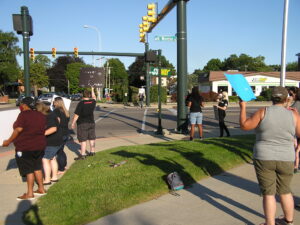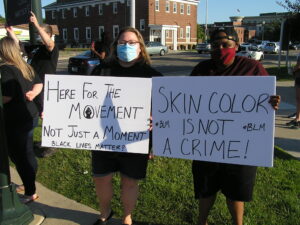
As protests against police brutality continue around the country, organizers in Monroe are following suit to rally people around the Black Lives Matter movement.
Azia Hawthorne, 39, has lived in Monroe for eight years after moving from Chicago and said she has been to 12 BLM protests over the past two months.
Hawthorne said she met Katybeth Davis, who organized a march downtown, during the first big protest in Monroe this summer.
“It was Breonna Taylor’s death in March, then George Floyd’s death in May,” Hawthorne said. “I just couldn’t take it anymore and I wanted to be a part of something bigger to bring awareness.”
She said there are two pandemics: COVID-19 and violence against Black people at the hands of the police.
“I feel like I needed to step up and do something,” Hawthorne said.
She said a successful protest shouldn’t be judged by the turnout but on the connections that people make with one another.
“Knowing I connected with at least one person and they’re on board with having a conversation with their friends and so on and so forth, then that’s successful to me,” Hawthorne said.
She said it is time for equality given the 400-year history of Black oppression in America.
“I’m Black, my friend’s half Black but in this country, you’re still Black,” she said.
Hawthorne said she is worried for her nieces and nephews going off to college.
“I don’t want them to be fearful. I want them to be excited,” she said.
Growing up in the diverse area of Lincoln Park, Chicago, where she had a crush on a boy in high school who was white.
Hawthorne recalled an incident when the boy’s mother lashed out at her.
“I handed him a cookie, then his mom smacked it out of his hand and said, ‘You know those people are dirty! Why would you take something from her?’” Hawthorne said. “Then he goes, ‘Mom, that’s my girlfriend.’ Then his mom said, ‘Absolutely not.’
“I remember crying home to my dad and wondering why she didn’t like me.”
Hawthorne said her dad said some people would not like her because of the color of her skin.
Katybeth Davis, 36, said she has attended 25 protests in the last two months.
Being adopted, she said she recently discovered her biological father was Black.
Davis said deep down she had always known this, with some of her family not completely accepting her at a young age.
“It started with my own family and my grandmas, uncles and aunts all said the ‘N-word,’” she said. “And when my mom brought me home, then my grandma asked my mom if they had ‘N-words’ on sale.”
She remembered being happy after discovering a Black history club when she transferred to Monroe High School.
“I had no idea about it, and it was the first club I signed up for,” she said. “I was so excited to be around people who looked like me.”
Davis said she will educate her kids about the Black Lives Matter movement and the importance of passing along that knowledge.
“I hope racism ends one day,” she said. “It’s probably going to take this generation and the next one.”

Amanda Althouse, 26, said she has attended at least eight protests, organized three or four of them and has more in the works.
She’s also organized an event with Hawthorne, with the largest number of participants ranging from 200 to 300 people.
“The Black Lives Matter movement means creating a world free of prejudices and racism that can cause violence and the oppression of Black people,” Althouse said.
Althouse is a part of the Orchard Center High School community and said she wants to set an example for her students.
“The next generation has the power to make a change that some of us will not see and the best thing you can do is give the motivation and opportunity to act on that change,” she said.
Althouse said she knows students who have faced racism in their lives and are using that as motivation to speak out.
“We can absolutely add to our course material in regard to Black history and history that is from a non-white perspective,” she said. “Lead by example.”
Adeana Buckley, 38, said she supports the Black Lives Matter movement but is not behind the entire organization.
She saw a post online of an incident where a man named Ahmaud Arbery was shot and killed by three men while jogging in Brunswick, Ga.
“That was my first pull to anything like this and those guys were just chasing him while he was running, then brutally shooting him,” Buckley said.
“I just thought this was crazy because I have kids and a husband who are biracial and it’s sick to judge someone by their skin color.”
“I stand up for Black Lives Matter on my own and through my own experiences,” she said.
She and her husband, Kyle Buckley, have experienced discrimination.
“They pulled him over for no reason at all, which was close to the house and tried to say it was over a ticket in Taylor and said they thought he was someone else,” she said.
Regardless of the situation, Buckley said she still believes there are good officers.
“We just believe that some need to be pointed out and have light shined on them so they can be penalized for what they do,” she said.
She said Monroe’s Police Department needs better training.
“If some cared enough, then more effort will be put in to putting the bad guys away,” Buckley said.
She said the school system also needs improvement.
Buckley spoke of a time when her son, Nato Gandara, 15, was playing a school football game where his team was winning, prompting the opposition to call him racial slurs.
“My son used it as positive aggression and really tackled these guys,” she said. “He was doing very well, but after the game he was mad.”
She said she was shocked that her son had to experience that situation.
Tennery Hicks, 25, said she co-hosted a protest with a friend, Hayley Krieger, where social media played a role in gathering individuals together.
A police officer helped them block off roads for their safety, which Hicks says proves there are still good officers.
“A lot of people who support Black Lives Matter are willing to educate others instead of talking down on others for their opinion,” Hicks said.
Hicks recalled complications she had with a college job where she was being treated differently compared to a coworker.
“I started noticing favoritism, as far as the shifts she got and side-by-side help,” Hicks said.
Hicks said people can be motivated to change.
“I would like to see racist people not being so comfortable and to change their mind,” she said. “I want everyone to come together to make a change.”

